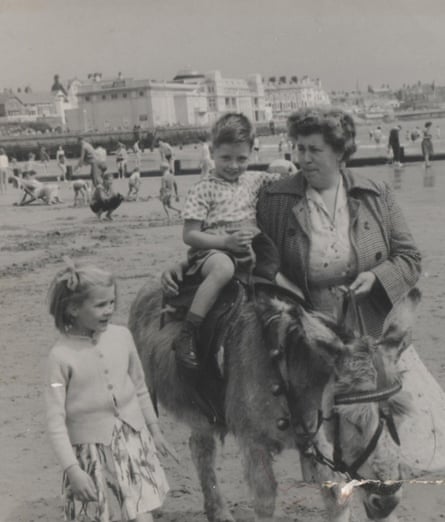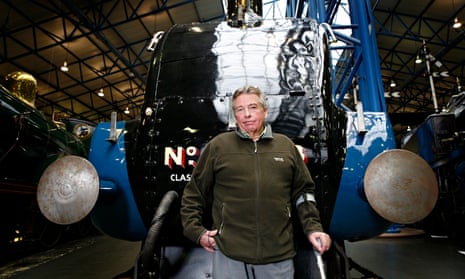David Hayes stands before the Mallard steam locomotive in York’s National Railway Museum, a little wistful for a lost life as a train driver. At 58, it seems unlikely that he will realise his childhood dream to follow in the footsteps of his father, who drove the Mallard, the Flying Scotsman and other hulking beasts of a bygone era.
Hayes’s early ambition, though, has been given new impetus by an extraordinary change in his circumstances and prospects. More than half a century after being written off as a “spastic”, Hayes is on his feet, pain-free and full of hope, determination and gratitude. After enduring a childhood in calipers, and part of his adult life in a wheelchair, Hayes doesn’t, it turns out, have cerebral palsy after all.
Three years ago, he had “almost lost the will to live”, was in constant pain, unable to sleep and deeply depressed. “My life wasn’t worth anything. I had suicidal thoughts.” Now, he says: “My story is a story of hope for others.”
Hayes was born at home in York in 1956, a surprise fourth child for his mother Doreen, who had not realised she was pregnant until the seventh month, and his father, Charlie, the train driver. The labour and delivery were quick – there was no time to get to hospital – but uncomplicated, and the baby appeared healthy. But by the time Hayes was two, Doreen felt something was wrong. He was unable to walk, but the family doctor reassured her that he was just a slow developer. “Mum got very desperate. Dad was always at work and she was left to deal with everything on her own. No one would listen to her.”

It wasn’t until Hayes was five, and still not walking, that he was seen by a specialist. “This was 1961. The words used were: ‘This child is a spastic. He will never achieve anything. He’ll never learn anything. He’ll never be able to look after himself. There’s nothing that can be done, he’s brain-damaged.’ ”
Worse, Doreen was told that her child’s cerebral palsy was her fault, for giving birth at home without medical supervision. “That stayed with her for the rest of her life.”
Hayes was sent to a special school in York where, in three years, the only thing he learned was how to tell the time. Some children were force-fed, some were abused, he says. But, with his legs supported by iron calipers, he began walking. At eight, with a patently unimpaired intellect, he moved to a mainstream school, where he was taunted as a “cripple”. “It was hard, a right challenge. But I was determined not to go back to special school, so I had to make it work.”
At 16, with a respectable clutch of qualifications, he left school. The local job centre sent him to the Spastics Society for assessment. “They had set views about what jobs disabled people could do. I thought, I’m not having them tell me what to do.” Having reluctantly abandoned his dream of being a train driver, Hayes was determined to be an electrical engineer.
Eventually, he was sent to a training centre for the disabled, and got his first job, repairing vacuum cleaners at a local firm. Seven years later, with £50, he set up his own electrical repair business, which thrived until he was forced to sell it after his hip dislocated when he was 28. By then, he was married with two children.
In search of help with claiming disability benefits, Hayes visited the local offices of the Spastics Society, despite his hatred of the word. Instead of practical assistance, he was offered a Christmas outing to Scarborough with other “spastics”. Infuriated, he joined the local committee and embarked on a campaign to change the organisation’s name and attitude. Twenty years ago, the Spastics Society became Scope, and Hayes eventually became its national vice-chairman, overseeing a £100m annual budget, 4,000 staff and 250,000 volunteers.
But in 2007, as pain overwhelmed him, he stood down. By then, a specialist in London had questioned the original 1961 diagnosis, partly prompted by Hayes’s children, who themselves suffered from intermittent joint pain. Three years ago, Hayes began to undergo a series of operations on his hip, knee and shoulder – the last just 12 weeks ago - that have finally left him pain-free.
The medical consensus now is that he never had cerebral palsy, but a congenital condition that he has passed on to his children in a mild form. “The absolute definitive answer can only come from a brain scan,” he says, adding that he has been told “this could have been fixed 25 years ago”.
“There’s no limit now. I’m not saying I’m going to be 100% fit and normal, but I’m ambitious to see how far I can get. It’s like learning to walk all over again. But I have no pain now, none at all. My life has been transformed.”
Hayes plans to return to work and resume paying taxes. “I want to pay back the NHS for their investment in my body. I was sitting in a wheelchair in incredible pain, and these guys sorted this out.”
Others might feel bitter about the original misdiagnosis and the consequent decades of misery. “I do have moments when I think there has been a lot of suffering. My life could have been different. But we are where we are.”
Any resentment is directed at the doctors who delivered that brutal message to his mother. “That was very harsh. You don’t forget that as a mother.” Doreen died in 2000, “but she did see me achieve far more than anyone expected.”
Hayes hopes to achieve more. The Mallard engine towers over him in the Great Hall of the National Railway Museum. He recalls his father’s tales and even being sneaked into the cabin on the odd occasion. “I still want to be a train driver,” says Hayes. “The dreams you have never leave you.”

Comments (…)
Sign in or create your Guardian account to join the discussion